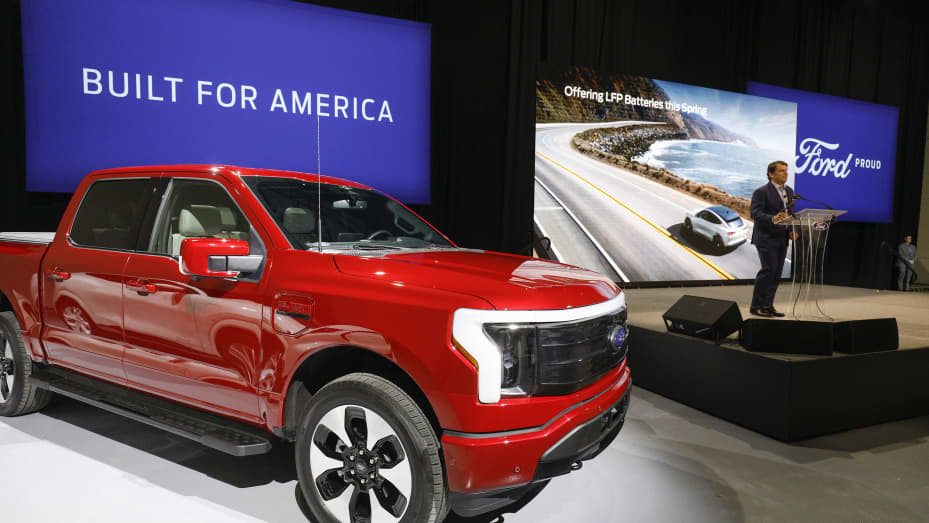US lawmakers are looking into a licensing agreement between Ford Motor and China-based CATL that would allow the automaker to manufacture battery cells produced by the global supplier at a proposed $3.5 billion Michigan plant.
In a letter sent to Ford CEO Jim Farley on Thursday, the chairs of the House Select Committee on the Chinese Communist Party (CCP) and the House Ways and Means Committee demanded that the automaker provide a copy of the licensing agreement as well as any communication between the two companies and the Biden administration regarding any potential tax credits.
The letter also questions the number of Americans employed by the plant in comparison to Chinese workers; whether the deal should qualify for federal tax funding; CATL’s potential links to forced labor practices; and whether the deal helps to reduce the country’s reliance on China for parts and materials for electric vehicles.
According to the Detroit manufacturer, the Michigan facility will open in 2026 and will employ approximately 2,500 workers. It will make new lithium iron phosphate batteries, or LFPs, rather than the more expensive nickel cobalt manganese batteries it is now utilizing. The new batteries are projected to provide several benefits at a cheaper cost, allowing Ford to increase EV manufacturing and profit margins.
Also, see:
Microsoft’s keys were lost, and the government was hacked
China’s OpenAI challenger Zhipu AI gets Meituan funding
Tesla hits $25B in Q2 revenue, but margins decrease amid price cuts
Ford is following Tesla in utilizing LFP batteries in a fraction of its vehicles, in part to lower the quantity of cobalt required to manufacture battery cells and high-voltage battery packs.
According to the letter, several hundred of the anticipated 2,500 jobs will be staffed by CATL employees from China until the licensing deal expires in 2038.
“Indeed, although the executives of the proposed project will be US-based Ford employees, it appears that the project will rely on CATL employees from the PRC to maintain operations in the long term,” the lawmakers wrote.
Since its announcement in February, Ford has steadfastly defended the acquisition, claiming that it is only licensing the company’s procedures for its factory in rural Michigan, which will be a completely owned subsidiary with thousands of U.S. employees.
T.R. Reid, a spokesman for Ford, said Friday that the company is studying the letter but declined to comment directly on the message.
“Broadly, a lot of what’s been said and implied about this project is wrong. Instead of buying these batteries from suppliers in Asia – like other automakers do today – we’re investing $3.5 billion to make them in a plant built and run by a wholly owned Ford subsidiary, creating 2,500 new American jobs in the process. This is good for customers, good for the country and good for our company,” he said in an emailed statement.
According to company representatives, the battery cells produced at the plant will be qualified for federal incentives under the Biden administration’s Inflation Reduction Act.
The IRA offers credits of $35 per kilowatt hour produced and $10 per module for locally produced battery cells. Ford stated in May that once fully operational, the plant will have an annual output of around 42 gigatonnes.
Chinese Ties
Some Republican legislators, like Sen. Marco Rubio and Rep. Jason Smith, chairman of the House Ways and Means Committee, have previously questioned Ford’s partnership with CATL. Smith and Rep. Mike Gallagher both signed the letter on Thursday.
Gallagher, who chairs the House Select Committee on the CCP, has led multiple investigations into US-China commercial ties. In view of the Chinese Communist Party’s alleged human rights violations and military actions, the Wisconsin Republican recently questioned American firms’ readiness to collaborate with Chinese firms.
“You’re taking on the CCP as your business partner when you’re doing business in China,” Gallagher told reporters earlier this week. “To me, the far more fundamental question is why do so many American businesses and asset managers want the CCP as a business partner?”
Smith had already written to Farley in April, requesting information about the agreement with CATL, formerly known as Contemporary Amperex Technology Co. Farley’s prior responses, according to the current letter, “did not provide the level of detail sought by the Committee.”
CATL also has a relationship with Xinjiang Lithium through former senior manager Guan Chaoyu, who bought the brand through a limited partnership after CATL surreptitiously unloaded 23.6% of its ownership position shortly after the license arrangement was revealed.
“Xinjiang Lithium—which aims to become the largest lithium carbonate producer in the world—is tied through wholly-owned subsidiaries and other relationships to companies that engage in state-sponsored labor transfer programs in the Xinjiang region,” the lawmakers wrote. “The laborers in these programs are in many cases ‘transferred directly from camps to factories’ and ‘subjected to constant surveillance.’”



















